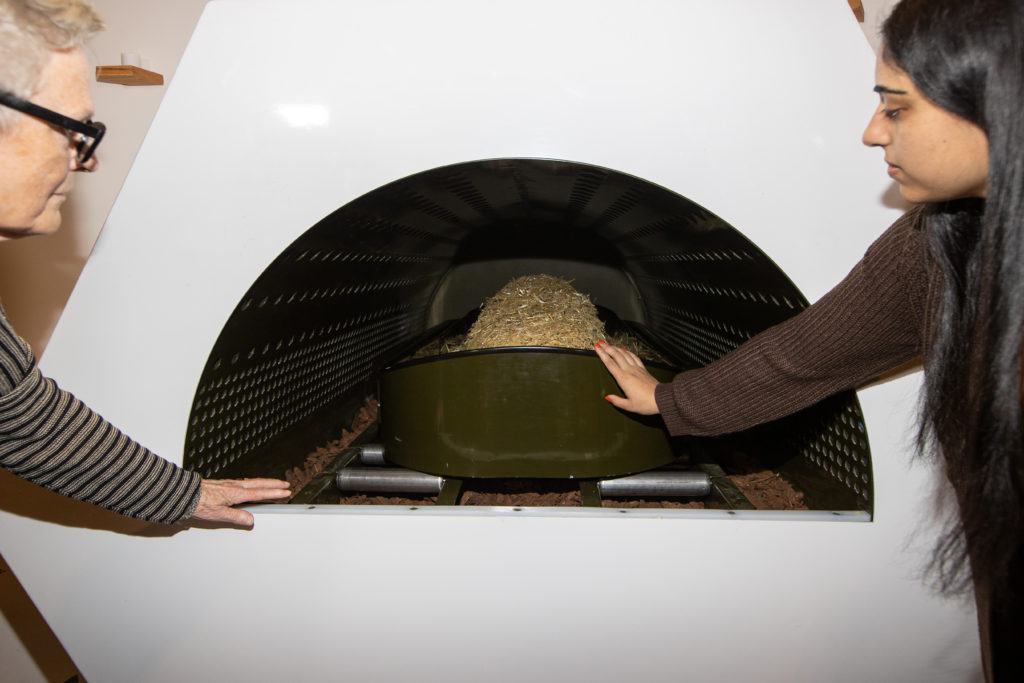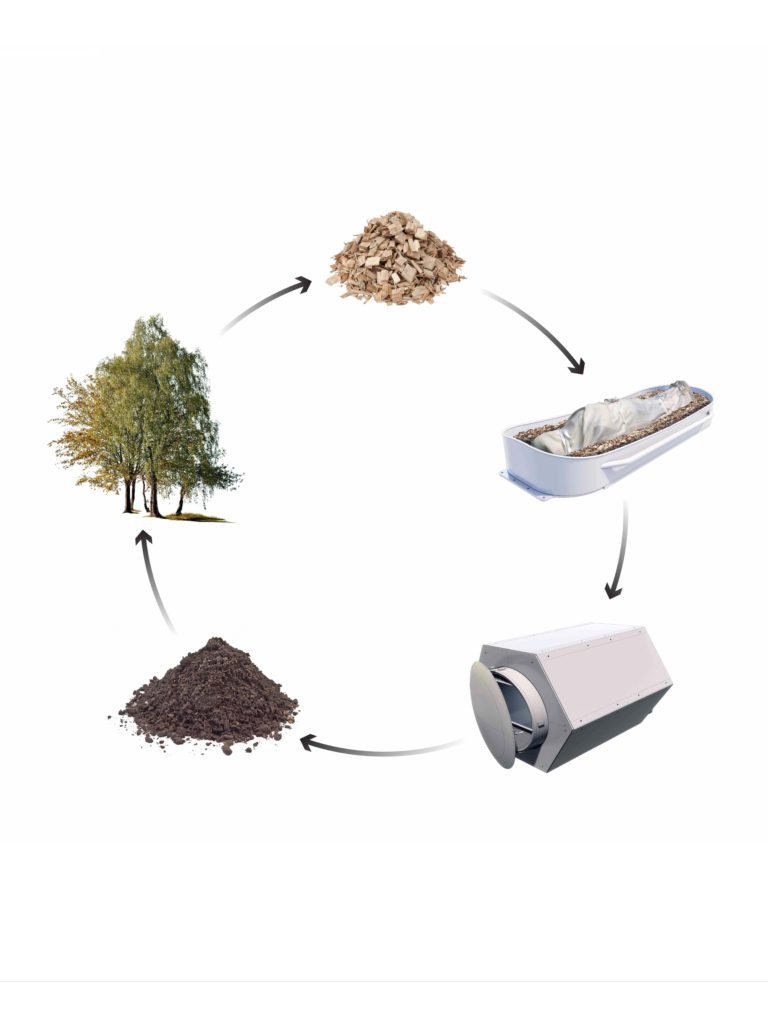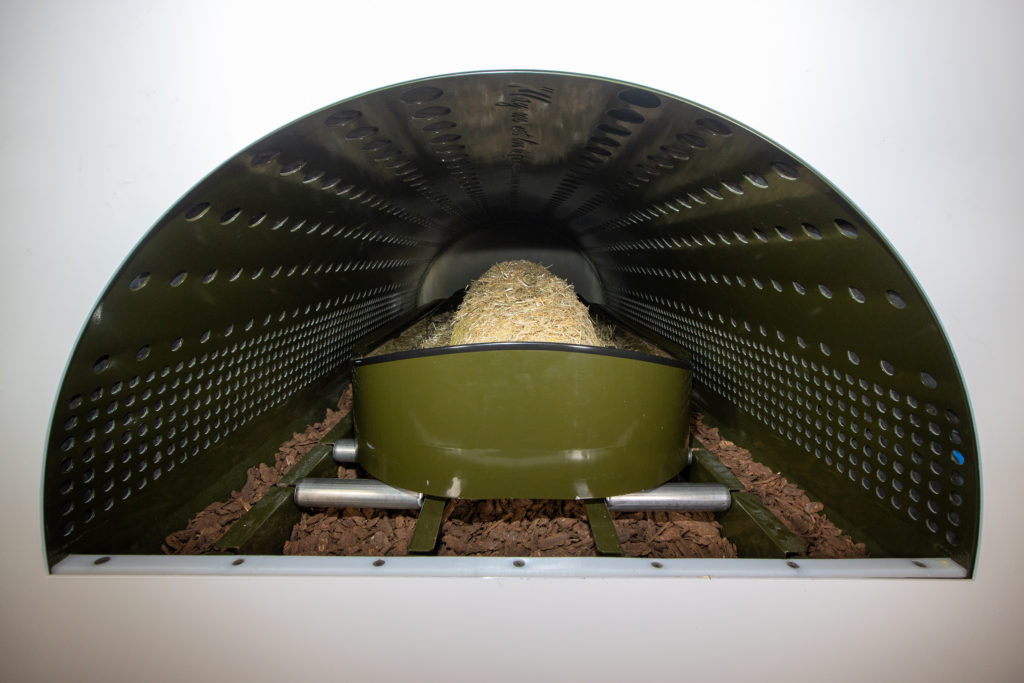Human composting, also known as “recomposition” or “terramation,” is a process by which human remains are transformed into nutrient-rich compost through the natural process of decomposition. Basically, like with brown and green composting material, the person’s body decomposes into smaller components that can be used by plants as nutrients. This method of final disposition offers a sustainable and eco-friendly alternative to traditional burial or cremation and is now permitted by several states.
Featured Image Source: Recompose
How Human Composting Works
The process of human composting begins with a body being placed in a specially designed vessel, often made of wood or other natural materials. The vessel is then filled with organic materials such as straw, leaves, and wood chips to aid in the decomposition process.
Microorganisms, including bacteria and fungi, break down the body and convert it into compost over a period of several months, sometimes as short as a month.
After a period of time, typically from one to several months, loved ones of the deceased are given the resulting compost to use as they see fit. This is very similar to receiving a loved one’s ashes after cremation, except in this case, their remains can be added to a garden, lawn, or other natural areas. A body will create about one cubic yard of soil.
Their remains will add to the health of the soil of the area, allowing your deceased loved one to give back to the environment even after they have passed away while reducing their environmental footprint when compared to the traditional methods of burial or cremation.

The Benefits of Human Composting
There are several benefits of human composting over cremation and burial. Besides giving nutrients back to the environment, human composting reduces energy and harmful emissions and it can be slightly cheaper.
Environmental Benefits
One of the main benefits of human composting is its environmental impact. Generally, our loved ones are either buried or cremated, both have a significant environmental impact.
Traditional burials require the use of embalming fluids and caskets, which can release harmful chemicals into the ground. We don’t often think about the resources required for burial but they can be incredible.
One estimate, from the Berkely Planning Journal, puts the usage of the annual material at burials at
- Over 30 million pounds of hardwood
- 2,700 tons of copper and bronze
- Over 104,000 tons of steel
- Over 1.6 million tons of reinforced concrete
In a world where we are rightly concerned about the impact of the loss of trees in the Amazon and the impact of concrete on the environment, these numbers are measurable contributors to the associated harms being done to our environment.
Human composting doesn’t carry of these costs in materials, so each person who chooses composting versus a burial is a direct reduction and benefit to the environment.
About half of decedents each year choose cremation. Cremation, while less harmful, still requires large amounts of energy and contributes to air pollution. Composting is estimated to use about an eighth of the energy required for cremation and over 400 pounds of carbon dioxide, which is a leading greenhouse gas. This is the equivalent of the carbon dioxide produced by driving a car about 470 miles.
Composting doesn’t use any fossil fuels, which is significantly different from the natural as typically used by crematoria. It also doesn’t produce any harmful gasses.
Human composting, on the other hand, is a natural process that returns the body to the earth sustainably.
Additionally, the nutrient-rich soil produced by the process can be used in gardening and agriculture, providing a valuable resource to the community.

Human Composting is Cheaper
There is a $20 billion industry dedicated to helping us take care of our deceased loved ones. This can be very profitable for them and expensive for us, especially when there is a lot of opportunity for upselling and cross-selling. Who doesn’t want Uncle Joe to have the nicest casket available?
Traditional burials and cremations can be expensive, with the cost of a casket and burial plot alone reaching thousands of dollars. Human composting, however, is a lower-cost alternative that can be done for a fraction of the cost.
Though the process is cheaper, companies that facilitate the process know the market and, unfortunately, you may not save as much money as you’d like. For example, one company, Recompose, charges about $7,000 to compost the deceased. Given that the median cost of a traditional funeral in 2021 was $7,848, this isn’t a large difference but it is measurable and it’s more difficult to upsell the grieving family.
We Are Running Out of Space
Land is limited and it’s expensive. As populations continue to grow and land becomes scarcer, cemeteries run out of space to bury the dead. This has led to the use of multi-layer graves and the reopening of older graves, which can be disrespectful to the deceased and their families.
Composting our Bodies
Despite its benefits, human composting is not yet widely accepted or legal in many states. However, it is gaining traction as more people become aware of the environmental impact of traditional burials and cremations. Several states have passed legislation to legalize human composting, and several other states are considering similar measures.
It’s worth noting that many people might not be comfortable with the idea of human composting, as it may be considered too unconventional. However, it’s important to remember that the process is natural, dignified, and respectful to the deceased. Moreover, the compost produced from human remains is safe to use and poses no health risks. After all, it has been done in various ways for years. As the Bible tells us
“By the sweat of your brow you will eat your bread until you return to the ground–because out of it were you taken. For dust you are, and to dust you shall return.” (Genesis 3:19)
Where Can You Compost a Human?
Several states allow human composting instead of burying or cremating a loved one.
Here are the states that currently allow human composting:
- California
- Colorado
- New York
- Oregon
- Vermont
- Washington State
Additionally, human composting is already legal in Sweden
When Human Composting Isn’t Recommended
There are a handful of scenarios where composting isn’t a great option for someone. This is largely the case in scenarios where the person had a condition or treatment that might be harmful if their remains are added to soil after composting. Here are a few examples:
- Diseases Like Tuberculosis – If the decedent had a disease like tuberculosis, which is caused by bacteria, then there is a risk that the bacteria is added back to the soil. Even though the compost is heated before it’s finished to kill off most organisms, some disease-causing microorganisms are more difficult to kill than others.
- Some Kinds of Radiation Treatment – If the person had some types of radiation treatment, where seeds are placed in the body, less than a month before composting, those seeds need to be removed before composting or they could contaminate the soil.
The Problems or Objections to Human Composting
For some, composting another person is disrespectful when compared to traditional methods. For example, Catholic bishops in New York are opposed to it, reportedly arguing that bodies should not be treated like waste.
For some, the idea of adding the remains of a loved one seems disrespectful. Yet, for centuries, this was the norm.
